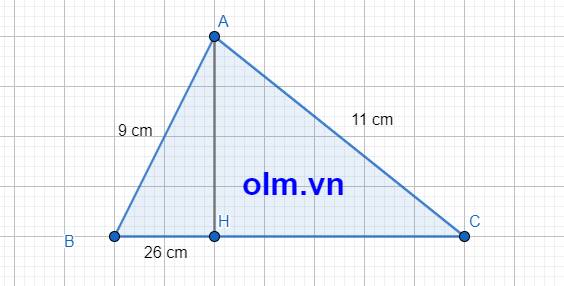
Hãy nhập câu hỏi của bạn vào đây, nếu là tài khoản VIP, bạn sẽ được ưu tiên trả lời.


Lời giải:
1.
$x^3+3x^2-16x-48=(x^3+3x^2)-(16x+48)=x^2(x+3)-16(x+3)$
$=(x+3)(x^2-16)=(x+3)(x-4)(x+4)$
2.
$4x(x-3y)+12y(3y-x)=4x(x-3y)-12y(x-3y)=(x-3y)(4x-12y)=4(x-3y)(x-3y)=4(x-3y)^2$
3.
$x^3+2x^2-2x-1=(x^3-x^2)+(3x^2-3x)+(x-1)=x^2(x-1)+3x(x-1)+(x-1)$
$=(x-1)(x^2+3x+1)$

1)
\((x+2)(x+3)(x+4)(x+5)-24\\=[(x+2)(x+5)]\cdot[(x+3)(x+4)]-24\\=(x^2+7x+10)(x^2+7x+12)-24\)
Đặt \(x^2+7x+10=y\), khi đó biểu thức trở thành:
\(y(y+2)-24\\=y^2+2y-24\\=y^2+2y+1-25\\=(y+1)^2-5^2\\=(y+1-5)(y+1+5)\\=(y-4)(y+6)\\=(x^2+7x+10-4)(x^2+7x+10+6)\\=(x^2+7x+6)(x^2+7x+16)\)
2) Bạn xem lại đề!

a)xm+4+xm+3-x-1
=(xm+4-x)+(xm+3-1)
=x(xm+3-1)+(xm+3-1)
=(x+1)(xm+3-1)
Với x=-2 ta có:... bn tự thay
b)x6-x4+2x3+2x2=x6-2x5+2x4+2x5-4x4+4x3+x4-2x3+2x2
=x4(x2-2x+2)+2x3(x2-2x+2)+x2(x2-2x+2)
=(x4+2x3+x2)(x2-2x+2)
=[x2(x2+2x+1)](x2-2x+2)
=x2(x+1)2(x2-2x+2)
Với x=-2 bn tự thay nhé h mk bận

Ta có :
\(AH^2=AB^2+BH^2\left(1\right)\) (Δ ABH vuông tại H)
\(AH^2=AC^2+CH^2\left(2\right)\) (Δ ACH vuông tại H)
\(\left(1\right),\left(2\right)\Rightarrow AB^2+BH^2=AC^2+CH^2\)
\(\Rightarrow CH^2=AB^2+BH^2-AC^2\)
\(\Rightarrow CH^2=81+676-121=636\)
\(\Rightarrow CH=\sqrt[]{636}=\sqrt[]{4.159}=2\sqrt[]{159}\left(cm\right)\)

Vì AH là đường cao của tam giác ABC nên AH \(\perp\) BC \(\equiv\) H
⇒ \(\Delta\) AHB \(\perp\) \(\equiv\) H \(\Rightarrow\) AB > BH ⇒ 9 cm > 26 cm vô lý
Em có hai sựa lựa chọn: 1 là em chỉ ra cái sai của cô
2 là em xem lại đề bài của em

\(\dfrac{4x+2}{4x-2}+\dfrac{3-6x}{6x-6}\left(dkxd:x\ne\dfrac{1}{2};x\ne1\right)\)
\(=\dfrac{2\left(2x+1\right)}{2\left(2x-1\right)}+\dfrac{3\left(1-2x\right)}{6\left(x-1\right)}\)
\(=\dfrac{2x+1}{2x-1}+\dfrac{1-2x}{2\left(x-1\right)}\)
\(=\dfrac{2x+1}{2x-1}+\dfrac{1-2x}{2x-2}\)
\(=\dfrac{\left(2x+1\right)\left(2x-2\right)}{\left(2x-1\right)\left(2x-2\right)}+\dfrac{\left(1-2x\right)\left(2x-1\right)}{\left(2x-1\right)\left(2x-2\right)}\)
\(=\dfrac{4x^2-2x-2}{\left(2x-1\right)\left(2x-2\right)}+\dfrac{-4x^2+4x-1}{\left(2x-1\right)\left(2x-2\right)}\)
\(=\dfrac{4x^2-2x-2-4x^2+4x-1}{\left(2x-1\right)\left(2x-2\right)}\)
\(=\dfrac{2x-3}{\left(2x-1\right)\left(2x-2\right)}\)
\(=\dfrac{2x-3}{4x^2-6x+2}\)

5x2 - 4(x2 - 2x + 1) - 5 = 0
=> 5x2 - 4x2 + 8x - 4 - 5 = 0
=> x2 + 8x - 9 = 0
=> x2 + 9x - x - 9 = 0
=> x(x + 9) - (x + 9) = 0
=> (x + 9)(x - 1) = 0
=> x + 9 = 0 => x = -9
hoặc x - 1 = 0 = > x = 1
Vậy x = -9, x = 1
\(5x^2-4\left(x^2-2x+1\right)-5=0\)
\(\left(5x^2-5\right)-4\left(x^2-2.1.x+1^2\right)=0\)
\(5\left(x^2-1\right)-4\left(x-1\right)^2=0\)
\(5\left(x-1\right)\left(x+1\right)-4\left(x-1\right)\left(x-1\right)=0\)
\(\left[5\left(x+1\right)-4\left(x-1\right)\right]\left(x-1\right)=0\)
\(\left(5x+5-4x+4\right)\left(x-1\right)=0\)
\(\left(x+9\right)\left(x-1\right)=0\)
\(\Rightarrow\orbr{\begin{cases}x+9=0\\x-1=0\end{cases}}\)
\(\Rightarrow\orbr{\begin{cases}x=-9\\x=1\end{cases}}\)
Vậy \(\orbr{\begin{cases}x=-9\\x=1\end{cases}}.\)

`x^2+x+1=x^2+x+1/4+3/4=(x+1/2)^2 +3/4`
Vì `(x+1/2)^2 >= 0` với mọi `x`
`=>(x+1/2)^2 +3/4 >= 3/4` với mọi `x`
`=>` Biểu thức Min `=3/4<=>x=-1/2`
_____________
`(x-3)(x+5)+4=x^2+2x-11=x^2+2x+1-12=(x+1)^2-12`
Vì `(x+1)^2 >= 0` với mọi `x`
`=>(x+1)^2-12 >= -12` với mọi `x`
`=>` Biểu thức Min `=-1/2<=>x=-1`
$m - 3 = 2m + 5$
=> $m - 2m = 5 + 3$
=> $-m = 8$
=> $m = -8$